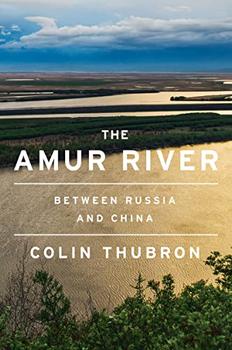Summary | Excerpt | Reviews | Beyond the Book | Readalikes | Genres & Themes | Author Bio

Between Russia and China
by Colin Thubron
Batmonkh listens to them without interest. He says they resent outside intruders in their land. I cannot understand a word they say, only silently hope they will not forbid us. Sometimes Batmonkh wanders away dismissively, while the rangers come and go, and our horsemen laugh at them with the despisal of free men for bureaucracy. Eventually the rangers present us with a document to sign, absolving them of any responsibility, and at last they leave, bouncing over the steppelands on their Chinese motorbikes, after washing their hands of us.
We should have listened to them, of course.
For the last time before we depart the sky looms vaster and more restless than the plains. From end to end the horizon seems sunk beyond the curvature of the earth, and above us spreads a panorama of discordant clouds. On one side they are merely smears of mist, on the other an armada of cumulus rolls into infinity.
For a moment we halt at the edge of the reserve; the next we are in underbush, following the Kherlen river where it descends from its watershed in the east. Already the slopes are steepening and darkening into forest. A late cuckoo calls. Half unconsciously, we are crossing the divide from Eurasian grassland to Siberian taiga, the scent of crushed wildflowers fading under our hooves, and all of us elated by our release.
But soon the terrain grows sodden. Sometimes the horses flounder in bog-water that is still flowing. Once, ominously, the ground beneath the leading horseman gives way, and his stallion – a handsome roan – collapses into a mud hole, and struggles up as he remounts.
By early afternoon we are riding along hills above the river. Buzzards are dropping low over its swamp. For miles we brush through stunted birch thickets, while larches troop down the mountainsides like an invading army, and infiltrate the valleys. The only sounds are our own. As the air sharpens, I sense the deepening remoteness of our path, and feel an old excitement at entering another country.
My horse is a twelve-year-old stallion who has no name. To the horsemen he is simply 'the White Horse'; any other label would be sentimental. He is tough and scarred. We ride in a straggling cavalcade of nine, our tents and food trussed on five packhorses. These beasts are strong and glossy after summer pasturing – not the sickly creatures of late winter. Short-legged and large-headed, they descend from the tireless horses of Mongol conquest, able to gallop ten kilometres without pause, and we ride them in the Mongol way, with legs bent back from the knees on short stirrups. The horsemen are in their early forties, herders and huntsmen, their faces wind-battered raw, their bodies pared lean. They too look tireless.
Yet their ancestors' ancient habitat was not steppeland but forest, from which they first emerged millennia ago, and for a long time our own transition is uneven, where grassy slopes still mingle with woodland as we travel back in time, and the early nomad hoof beats fade into forest silence.
Towards evening comes the first hint of trouble. One of our packhorses is still unbroken, and its wild energy unsettles the others. Ahead of us, in low woodland, they are suddenly thrusting and barging together, then they tear loose from their leading-ropes, three of them bolting back the way they came, their eyes dilated in fear, with the horsemen following.
Batmonkh and I tether the last pair to saplings, and wait. We wait for seeming hours. When the horsemen return with their charges, we find that the recalcitrant palomino has thrown off its baggage, which now lies somewhere – anywhere – in the forest around us. They return to search for it, while Batmonkh and I wonder disconsolately which of the giant saddlebags is missing. If it holds my rucksack, I realize, my passport and visas will be gone, and our journey ended. I tramp back along the way the horses disappeared, but the forest spreads around me in a glaze of concealing birch scrub. I hunt for panicky hoof-prints, smashed branches, and go down tracks that dissipate to the trail of some long-passed animal. The whinnying of the herders' horses sounds farther and farther away as their search widens. Sometimes in the undergrowth a fallen silver birch shines with a moment's hope – they are bright and smooth as china – but soon I cannot imagine finding anything at all in this wilderness.
Excerpted from The Amur River by Colin Thubron. Copyright © 2021 by Colin Thubron. Excerpted by permission of Harper. All rights reserved. No part of this excerpt may be reproduced or reprinted without permission in writing from the publisher.
Our wisdom comes from our experience, and our experience comes from our foolishness
Click Here to find out who said this, as well as discovering other famous literary quotes!
Your guide toexceptional books
BookBrowse seeks out and recommends the best in contemporary fiction and nonfiction—books that not only engage and entertain but also deepen our understanding of ourselves and the world around us.